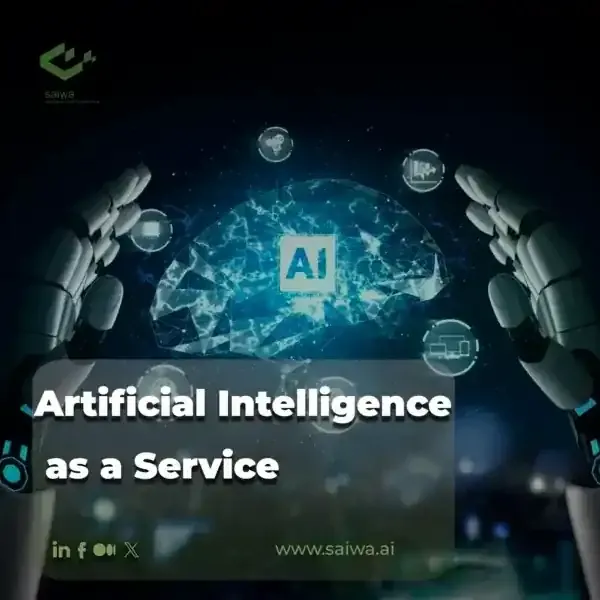Organizations worldwide spend billions annually on in-house AI infrastructure, yet many of data science projects never reach production. The challenge isn't understanding AI's potential but managing the specialized expertise required to build and maintain complex systems from scratch.
Artificial Intelligence as a Service (AIaaS) fundamentally changes this thing. By delivering pre-built AI capabilities through cloud platforms, AIaaS democratizes access to machine learning and AI. Organizations deploy production-ready AI solutions in days rather than months, paying only for usage.
This guide explores how AIaaS works, its core technologies, real-world applications across industries, and how platforms like Saiwa make AI accessible to businesses of any size.
What Is Artificial Intelligence as a Service?
AIaaS is a cloud-based delivery model that provides AI capabilities on demand without requiring extensive infrastructure or specialized expertise. Rather than building on’es own AI systems, organizations access pre-configured machine learning models, APIs, and development tools through subscription-based services.
This approach eliminates the need for significant upfront investment in hardware, software licenses, and dedicated AI teams.It is a low-cost, safe option for obtaining AI services. Through a graphical interface or an API, businesses can access powerful AI algorithms, machine learning services with user-friendly workflows.
Read Also: AI Platform as a Service and AI as a Service
An overview of How Artificial Intelligence as a Service Works
AIaaS functions through a systematic process that transforms raw data into actionable intelligence. Understanding this workflow helps organizations implement AI solutions effectively.
- Data Collection: The platform connects to your existing data sources through APIs or direct uploads. This can be structured databases or sensor data from IoT devices.
- Processing and Preparation: AI systems automatically clean, normalize, and format incoming data. This step handles missing values, removes duplicates, and transforms data into formats suitable for machine learning algorithms.
- Model Selection and Training: The platform applies pre-trained models or trains custom algorithms on your specific dataset. Deep learning frameworks and statistical models learn patterns and relationships within the data.
- Inference and Prediction: Trained models analyze new data in real-time, generating predictions, classifications, or recommendations. The system processes requests at scale, delivering results through APIs or dashboards.
- Optimization: Models improve over time by incorporating new data and feedback. The platform monitors performance metrics and automatically adjusts parameters to maintain accuracy and relevance.
Read More: What Is AI Models as a Service(AIMaaS)?

Types of Artificial Intelligence as a Service Solutions
AIaaS covers a range of service categories, each of which addresses a specific need with specialised capabilities. Understanding these categories helps organisations select solutions that align with their operational requirements.
Bots and Virtual Assistants
Thanks to natural language processing and generative AI, we can now automate customer interactions and internal workflows through human-like dialogue with conversational systems. These intelligent agents can handle enquiries, arrange appointments and solve problems, all the while learning from their interactions.
- The majority of consumers prefer rapid responses from AI chatbots over waiting for human representatives, demonstrating their effectiveness in meeting customer expectations.
- Advanced bots integrate with business systems to access information and escalate complex issues to human agents when necessary.
No Coding Solutions
These solutions make AI development more accessible by eliminating the need for programming skills through visual workflow builders and drag-and-drop interfaces. This gives business users in marketing, operations, and analytics the ability to create and deploy AI applications independently, without the need for technical expertise.
- Marketing teams build customer segmentation models using intuitive graphical environments.
- Pre-built templates and automated model training reduce development time significantly while maintaining professional-grade performance.
Application Programming Interfaces (APIs)
API-based AI-as-a-Service (AIaaS) delivers AI capabilities through standardised endpoints that integrate seamlessly with existing systems and workflows. Organisations can connect AI services to their applications, databases and business processes via simple API calls, allowing developers to incorporate sophisticated functionality without having to build models from scratch.
- Examples include OpenAI's GPT APIs for language generation, computer vision APIs for image analysis, and speech recognition APIs for transcription services.
- Developers can prototype AI features rapidly and scale production implementations without managing infrastructure or model training pipelines.
Data Labeling Services
The quality of training data is critical for the performance of AI models, making data annotation a vital foundation for successful implementation. AI-as-a-Service (AIaaS) data labelling solutions combine automated annotation tools with quality assessment mechanisms to create accurate and consistent datasets, which are essential for training effective models.
- These platforms accelerate the labeling process through semi-automated workflows and crowd-sourced annotation management.
- Pre-built models automatically tag data points while quality control systems ensure consistency and accuracy.
Read More : AIOps Platforms | The Top +10 in 2024

Real World Examples of Using AIaaS
AIaaS delivers measurable value across diverse sectors by addressing industry-specific challenges with scalable AI solutions.
- Financial Services: Fraud detection systems analyze transaction patterns in milliseconds, identifying suspicious activity with greater precision than rule-based
systems. Also businesses use Aaas to predict trends and make financial forecasts. - Chatbots and Virtual Assistants: AIaaS can interact with users and perform tasks such as scheduling appointments or making reservations, thereby elevating the customer experience. They use natural language processing (NLP) to comprehend and respond to what users say.
- Manufacturing and Quality Control: Computer vision systems detect product defects in real-time on production lines, achieving excellent accuracy while inspecting all of output. Predictive maintenance algorithms analyze equipment sensor data to forecast failures before they occur, reducing unplanned downtime by half.
- Retail and E-Commerce: Recommendation engines personalize shopping experiences by analyzing browsing patterns and purchase history.Inventory optimization models forecast demand across thousands of SKUs, minimizing stockouts and overstock situations.
- Healthcare and Diagnostics: Medical imaging AI assists radiologists by identifying anomalies in X-rays, MRIs, and CT scans with accuracy matching or exceeding human experts. Natural language processing extracts insights from clinical notes and research papers, accelerating diagnosis and treatment planning.
Technologies Behind AIaaS
AIaaS platforms leverage multiple interconnected technologies that enable sophisticated AI capabilities without requiring deep technical expertise from users.
Machine Learning Frameworks: TensorFlow, PyTorch, and scikit-learn provide the foundation for training models on structured and unstructured data. These frameworks handle everything from simple regression to complex deep learning architectures.
Computer Vision Systems: Convolutional neural networks (CNNs) process images and video to detect objects, recognize faces, classify defects, and extract visual information. These models power applications from manufacturing inspection to autonomous systems.
Natural Language Processing: Transformer architectures like BERT and GPT enable machines to understand, generate, and translate human language. Applications include chatbots, sentiment analysis, document summarization, and voice assistants.
Predictive Analytics Engines: Time-series forecasting, anomaly detection, and classification algorithms identify patterns in historical data to predict future outcomes. These models support demand forecasting, preventive maintenance, and risk assessment.
AutoML and Model Optimization: Automated machine learning tools select optimal algorithms, tune hyperparameters, and handle feature engineering. This democratizes AI by enabling non-experts to build effective models.
Benefits and Challenges
Aside from many advantages these services bring there are some disadvantages to consider before trying to shaft towards them.
Challenges
Data Privacy and Security Concerns: Sharing sensitive business data with third-party platforms raises legitimate security questions. Organizations in regulated industries face restrictions on where and how data can be stored and processed.
Limited Customization and Control: Pre-built models may not perfectly align with unique business requirements. Organizations have less visibility into model training processes, algorithm selection, and decision-making logic compared to in-house solutions.
Integration Complexity: Connecting AIaaS platforms with legacy systems, existing workflows, and proprietary databases can require significant technical effort despite simplified interfaces.
Vendor Lock-in Risks: Migrating trained models and workflows between different AIaaS providers can be difficult. Dependencies on specific platforms may limit flexibility and increase long-term costs.
Key Advantages
Rapid Deployment and Accessibility: AIaaS platforms enable organizations to implement AI solutions in days rather than the months required for custom development. Pre-built models and intuitive interfaces eliminate the need for extensive data science expertise.
Cost Efficiency and Flexibility: Pay-per-use pricing models eliminate large upfront infrastructure investments. Companies pay only for computational resources consumed, making AI economically viable for businesses of all sizes. Scaling resources up or down based on demand optimizes spending.
Continuous Innovation and Updates: Service providers continuously improve models with latest research advances. Users automatically benefit from enhanced algorithms, security patches, and new features without managing updates internally.
Focus on Core Business: Outsourcing AI infrastructure allows teams to concentrate on applying AI insights to business problems rather than managing servers, training pipelines, or model deployment infrastructure.
Harnessing AI as a service with Fraime
Here is an overview of what Saiwa’s Fraime platform offers and how its capabilities empower organizations to adopt AI faster, easier, and more efficiently.
- Unified AIaaS Platform: Fraime brings all essential AI capabilities—image processing, object detection, object counting, face authentication, and custom model training—into one seamless environment.
- Ready-to-Use AI Models: Users can instantly access a growing library of pre-built models for real-world tasks without needing ML expertise.
- Custom Deep Learning Training: Fraime allows teams to upload datasets, annotate them, and train specialized models through an intuitive UI or API, eliminating the need for complex machine-learning pipelines.
- Flexible Deployment: Deploy in the cloud for convenience and scalability, or on-premise for enhanced privacy, compliance, and data control.
- Developer-Friendly APIs: Every capability in Fraime is accessible via simple REST APIs, enabling fast integration into clients’ existing applications and workflows.
- Scalable Architecture: Designed to process thousands of images or requests in real time, suitable for industries such as manufacturing, agriculture, fintech, security, and logistics.
- Secure & Enterprise-Ready: Built with a strong focus on data protection, access management, and regulatory compliance.
- Continuously Expanding Capabilities: Upcoming features include image inpainting, advanced biometrics, speech and audio processing, and broader automation pipelines.
- Cost Effective & Time-to-Value: Fraime allows organizations to experiment, deploy, and scale AI solutions in days—not months—without hiring specialized AI engineers.
Users can begin using Saiwa’s Fraime platform by simply creating an account for FREE. Through the Fraime dashboard, users can upload images, run pre-built models, request for custom AI models, or train new models on their own datasets—all without writing code.
For developers, Fraime offers clean and well-documented APIs, enabling teams to integrate features like object detection, counting, face authentication, or custom-trained models directly into their applications with just a few endpoints. Organizations can also automate workflows, schedule processing jobs, and monitor performance in real time. Whether used by technical teams or non-technical operators, Fraime makes adopting and scaling AI both accessible and efficient.
How to Choose the Best Company?
Successfully implementing AIaaS requires strategic planning and systematic execution. Follow these steps to maximize value while minimizing risk.
- Define Business Problems: Identify specific business problems where AI can deliver measurable impact. Prioritize use cases with well-defined success metrics, available data, and executive support. Start with focused pilot projects rather than enterprise-wide deployments.
- Assess Data Readiness: Evaluate the quality, quantity, and accessibility of data required for your chosen use case. AIaaS platforms require clean, representative datasets for training. Invest time in data collection and preprocessing before engaging with platforms.
- Select the Right Platform: Choose an AIaaS provider aligned with your technical requirements, budget, and industry needs. Saiwa offers specialized solutions for, agriculture uwith user-friendly interfaces and robust support.
- Start with Pilot Implementation: Deploy a limited-scope project to validate technical feasibility and business value. Use this phase to train internal teams, refine workflows, and demonstrate ROI to stakeholders before scaling.
- Monitor, Measure, and Optimize: Continuously track performance metrics against baseline measurements. Gather user feedback, identify improvement opportunities, and iterate on implementations. Leverage platform analytics to refine models and expand successful use cases across the organization.
Conclusion
Artificial Intelligence as a Service represents a fundamental shift in how organizations access and deploy advanced AI capabilities. By eliminating infrastructure barriers and specialized expertise requirements, AIaaS democratizes transformative technologies previously available only to tech giants with massive resources.
The subscription-based model delivers immediate value through rapid deployment, cost efficiency, and continuous innovation. Organizations focus on applying AI insights to business challenges rather than managing complex technical infrastructure.
Saiwa, through its Fraime platform, simplifies and accelerates AIaaS adoption for businesses by providing ready-to-use and do-it-yourself features in various fields like: image processing, object detection and counting, facial authentication, and custom deep-learning model training—all accessible via a unified interface or seamless APIs. With support for both cloud and on-premise deployment, Fraime meets the security and regulatory needs of diverse industries while eliminating the effort of managing AI infrastructure or specialized teams.
In contrast, organizations that do not leverage such services remain dependent on manual processes, slower analysis cycles, and less accurate decision-making, ultimately falling behind competitors who benefit from automation, real-time insights, and scalable data-driven intelligence.
Note: Some visuals on this blog post were generated using AI tools.

